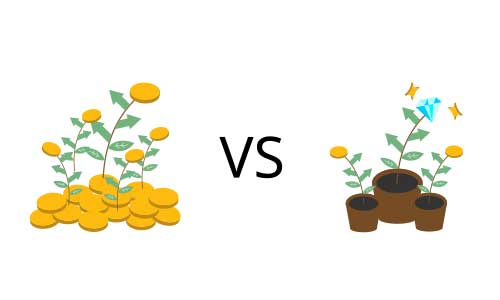SIP or FD: Which Is Better For Investment?
When it comes to securing your financial future, choosing the right investment option is important. Among the many choices available, Fixed Deposits (FDs) and Systematic Investment Plans (SIPs) are two of the most popular. Both have their advantages, but which is better FD or SIP?
This decision depends on various factors such as risk tolerance, investment goals, and time horizon. Let’s explore both options to help you understand the difference between FD and SIP, so that you can make an informed choice.
Best Investment Plans in UAE
Some of the best Investment quotes in UAE & Dubai are:





What is an FD (Fixed Deposit)?
An FD is a conventional investment option in which you make a one-time, fixed-term deposit with a bank or non-banking financial organisation (NBFC). The bank then pays you a guaranteed interest on your investment at a predetermined rate. These rates are typically unaffected by market conditions, making FDs a low-risk investment option.
Key Features of an FD:
- Guaranteed Returns: The interest rate on FDs is fixed at the time of investment, and you receive a guaranteed return.
- Low Risk: With fixed returns, FDs are ideal for conservative investors who prefer low-risk options.
- Liquidity: FDs come with a lock-in period and early withdrawals incur a penalty. However, you can choose the tenure based on your financial goals, ranging from 7 days to 10 years.
- Tax Benefits: Tax-saving FDs offer benefits under Section 80C of the Income Tax Act, provided the FD is for a minimum of 5 years.
What is an SIP (Systematic Investment Plan)?
Investing in mutual funds through an SIP involves contributing a fixed amount of money on a regular basis (monthly, quarterly, etc.) and allocating it to the fund of your choice. This approach allows you to benefit from rupee cost averaging, where you invest the same amount regardless of market conditions. This means that when the market is down, your fixed amount buys more units, and when the market is up, it buys fewer units.
Key Features of SIP:
- Market-Linked Returns: Unlike FDs, SIPs are subject to market fluctuations, meaning returns are not guaranteed but can potentially be higher.
- Flexible Investment: SIPs allow you to invest as little as Rs 500 per month. You can also increase or decrease your SIP amount according to your financial situation.
- Tax Benefits: SIPs in Equity-Linked Savings Schemes (ELSS) offer tax deductions under Section 80C, similar to tax-saving FDs.
- Higher Returns Potential: Over the long term, SIPs in equity mutual funds tend to deliver higher returns than FDs, but they come with higher risk.
- Rupee Cost Averaging: This strategy helps reduce the impact of market volatility, as the same amount is invested regularly.
Read our detailed article on Best SIP Plans for NRIs.
Difference Between FD and SIP
While both FD and SIP are popular investment choices, several differences can help you decide which one is more suitable for you —
| Feature | FD (Fixed Deposit) | SIP (Systematic Investment Plan) |
|---|---|---|
| Nature of Investment | Lump sum investment | Investment in regular installments |
| Risk | Low risk (capital is preserved) | Moderate to high risk (depends on market) |
| Returns | Fixed and guaranteed | Market-linked (variable returns) |
| Liquidity | Low (Penalties on early withdrawal) | High (No penalties on withdrawal) |
| Taxation | Taxed according to income tax slab | Taxed on long-term or short-term capital gains |
| Ideal For | Conservative investors seeking stability | Investors aiming for higher returns over time |
| Investment Period | Fixed tenure, typically 7 days to 10 years | Flexible, can be continued for years |
| Minimum Investment | Higher (typically in multiples of Rs 1,000 (AED 43) | Low (as low as Rs 500 (AED 22) per month) |
SIP Calculator
FD vs SIP: Which is Better?
The choice between SIP vs FD depends on your financial goals and risk tolerance. Let's look at both options to help you decide —
- Choose FD if: You want to preserve capital, have a low risk appetite, and prefer guaranteed returns. It's ideal for short-term goals like saving for a vacation, purchasing a car, or emergency funds.
- Choose SIP if: You aim for higher returns and are comfortable with market fluctuations. SIPs are better for long-term goals like retirement planning, building wealth, or saving for children's education.
Tip: If you have a low-risk tolerance and want to guarantee returns, an FD is a better choice.
However, if you're aiming for higher returns and are willing to take on some risk, an SIP in mutual funds may be a more suitable option.
Frequently Asked Questions
1. Is SIP better than FD?
If you are someone who wants to invest small amounts of money regularly and is comfortable with moderate risk, you can consider investing in SIPs.
2. Does SIP give better returns?
SIPs have the potential to provide better returns compared to FDs over the long term However, it’s important to note that SIP returns are market-linked, meaning they can fluctuate depending on market conditions.
Know More About Other Insurance Product
More From Investment
- Recent Articles
- Popular Articles






















